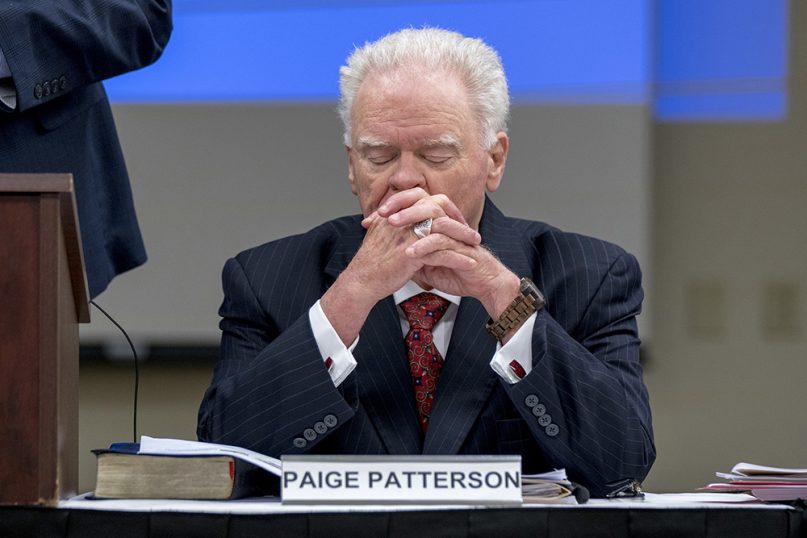Paige Patterson closes his eyes during a special meeting of the Southwestern Baptist Theological Seminary trustees on May 22, 2018. Photo by Adam Covington/SWBTS via Baptist Press
Need to know: Monday, June 11, 2018
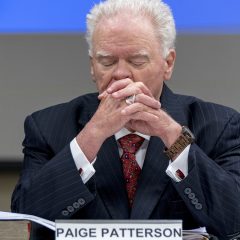
Patterson won’t address meeting as Southern Baptists gather amid scandals
"The mood of the Southern Baptist Convention right now would be similar to that of the country after Watergate," said Russell Moore, president of the SBC’s Ethics and Religious Liberty Commission.
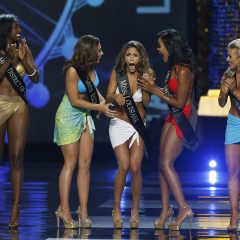
Why weren’t Christians the ones to ‘ruin’ Miss America?
The little known history of how America's Christians became entangled with America's beauty pageant.
Austria to close seven mosques and expel 60 imams
It's the first time officials are invoking Austria's controversial "law on Islam." They say it's "just the beginning" of a crackdown on political Islam.
How to talk about God in Silicon Valley
In the least religious part of the U.S., tech puts its faith in science and progress, leaving Christians to navigate a sometimes uneasy existence.
‘Make sure not to talk any Arabic’: American Muslims and their guns
American Muslims say they own guns for the same reasons as anyone else. (Subscription may be required.)
The Fred Rogers documentary ‘Won’t You Be My Neighbor’ feels radically subversive
Mr. Rogers’s worldview, a kind of humanism that had roots in his Christianity, is what helped many navigate the scariest events of childhood.
Latest news from RNS
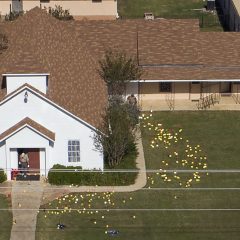
Lawsuit: Government negligent in Texas church massacre
DALLAS (AP) — The suit, filed in federal court in San Antonio, alleges the the military failed to enter the information into a database used to conduct background checks of gun buyers.

Pope to oil execs: Clean energy is an ‘epochal’ challenge
VATICAN CITY (AP) — "Civilization requires energy, but energy must not destroy civilization," he implored.

Cardinal to African faith leaders: Negotiate peace with terrorists
As violence-torn Africa grows weary of solutions that haven’t worked, Nigerian Cardinal John Onaiyekan is proposing a controversial alternative.
More views from RNS
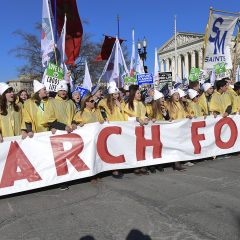
We must keep fighting to outlaw abortion: A response to Thomas Reese
After Ireland's referendum, RNS Senior Analyst Tom Reese wrote that anti-abortion activists need a new pro-life strategy. Cardinal Timothy Dolan responds: "May we never give in to the culture of death."
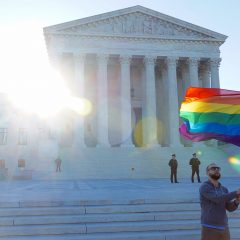
5 reasons the Masterpiece Cakeshop decision is a victory for all Americans
The following is a guest post by Skye Jethani
The case of the Colorado baker who refused to create a cake for a same-sex wedding has been a topic of heated debate since 2015. My writings about the case have received criticism from both conservative Christians and marriage equality advocates because I sided with the cake maker (upsetting liberals) but not on the grounds of religious liberty (upsetting conservatives). Instead, I saw the case as a matter of free speech in which the “LGBTs vs. Christians” lens was largely irrelevant.
Nonetheless, many insisted that the case represented the front line in the culture war. The high court, both side hoped, would finally decide whose rights trumped whose. Did religious belief outweigh gay marriage, or did sexual orientation outweigh religious liberty?
This week, the Supreme Court finally ruled on the case in a surprising manner allowing neither side to declare a total victory or defeat. Here are my five reasons why we should see the decision as a victory for the common good rather than either side in the culture war.
 Image courtesy of Skye Jethani[/caption]
This decision proved they were wrong. The court voted 7-2 for the cake maker with three of the justices who voted for same-sex marriage in 2015 (Kennedy, Kegan, and Breyer) siding with the conservatives. That margin means the outcome would have been the same even if Hillary Clinton had won the election and had appointed her own nominee to the bench. Progressives cannot blame the decision on Justice Gorsuch, Donald Trump, Russian interference in the election, or the Republicans in the Senate who stonewalled President Obama’s nominee, Merrick Garland, for 10 months.
It also serves as a reminder to conservatives that the court is not as hostile to religious liberty as pundits and Republican fundraisers would have them believe. In fact, the court—including its more liberal members—has a very strong record of defending religious liberty.
Image courtesy of Skye Jethani[/caption]
This decision proved they were wrong. The court voted 7-2 for the cake maker with three of the justices who voted for same-sex marriage in 2015 (Kennedy, Kegan, and Breyer) siding with the conservatives. That margin means the outcome would have been the same even if Hillary Clinton had won the election and had appointed her own nominee to the bench. Progressives cannot blame the decision on Justice Gorsuch, Donald Trump, Russian interference in the election, or the Republicans in the Senate who stonewalled President Obama’s nominee, Merrick Garland, for 10 months.
It also serves as a reminder to conservatives that the court is not as hostile to religious liberty as pundits and Republican fundraisers would have them believe. In fact, the court—including its more liberal members—has a very strong record of defending religious liberty.
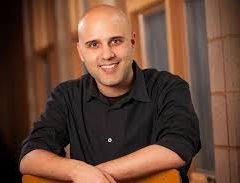 Image courtesy of Skye Jethani[/caption]
Skye Jethani (@skyejethani) is an award-winning author of five books including What’s Wrong With Religion?, co-host of The Holy Post podcast, a former executive editor at Christianity Today, and an ordained pastor.
Image courtesy of Skye Jethani[/caption]
Skye Jethani (@skyejethani) is an award-winning author of five books including What’s Wrong With Religion?, co-host of The Holy Post podcast, a former executive editor at Christianity Today, and an ordained pastor.
1. The decision was not determined by the 2016 presidential election
We’ve become used to 5-4 split decisions from the Supreme Court on controversial cases including Burwell v. Hobby Lobby, Citizens United v. FEC, and Obergefell v. Hodges which legalized same-sex marriage. So, when Justice Scalia died in February 2016, filling his vacancy on the court became a central issue of the presidential campaign with many assuming their vote for Trump or Clinton would make a difference in the battle between gay rights and religious liberty. [caption id="attachment_3708993" align="alignright" width="300"] Image courtesy of Skye Jethani[/caption]
This decision proved they were wrong. The court voted 7-2 for the cake maker with three of the justices who voted for same-sex marriage in 2015 (Kennedy, Kegan, and Breyer) siding with the conservatives. That margin means the outcome would have been the same even if Hillary Clinton had won the election and had appointed her own nominee to the bench. Progressives cannot blame the decision on Justice Gorsuch, Donald Trump, Russian interference in the election, or the Republicans in the Senate who stonewalled President Obama’s nominee, Merrick Garland, for 10 months.
It also serves as a reminder to conservatives that the court is not as hostile to religious liberty as pundits and Republican fundraisers would have them believe. In fact, the court—including its more liberal members—has a very strong record of defending religious liberty.
Image courtesy of Skye Jethani[/caption]
This decision proved they were wrong. The court voted 7-2 for the cake maker with three of the justices who voted for same-sex marriage in 2015 (Kennedy, Kegan, and Breyer) siding with the conservatives. That margin means the outcome would have been the same even if Hillary Clinton had won the election and had appointed her own nominee to the bench. Progressives cannot blame the decision on Justice Gorsuch, Donald Trump, Russian interference in the election, or the Republicans in the Senate who stonewalled President Obama’s nominee, Merrick Garland, for 10 months.
It also serves as a reminder to conservatives that the court is not as hostile to religious liberty as pundits and Republican fundraisers would have them believe. In fact, the court—including its more liberal members—has a very strong record of defending religious liberty.
2. The decision supporting the Christian baker was written by the same justice who wrote the decision legalizing gay marriage
In an inspired choice, the court assigned the task of writing the majority opinion to Justice Kennedy—the same moderate judge whose swing vote decided Obergefell and who wrote the opinion that legalized same sex marriage three years ago. Kennedy has become a hero to advocates of marriage equality for his principled articulation of the right of all Americans, regardless of their sexual orientation, to marry. Therefore, his equally principled defense of Jack Phillips, the Christian cake maker, cannot be dismissed as the biased logic of an anti-gay conservative. To his credit, Kennedy affirms the dignity and sympathizes with both sides in the debate. Kennedy’s authorship of both decisions also means future generations of American legal scholars will have to weigh both gay rights and religious liberty together. These are not matters that easily fall along conservative and liberal fault lines. Which leads to my third point.3. The decision sidesteps the culture war and identity politics
These days it feels like everything from the NFL to the latest Star Wars film is caught up in partisan divisions and red/blue tribal identity. The “us versus them” mindset has paralyzed Washington and prevented our political leaders from making headway on life-saving issues most Americans agree on like firearm safety and the opioid epidemic. The Supreme Court’s decision yesterday avoided this trap and kept the court out of the scrum of the culture war by offering a narrow ruling specific to this case rather than a broad precedent. Although advocates on both sides were hoping for a knockout punch, the court refused to say whether religious liberty or gay rights had the upper hand. It did not go along with the winner-take-all mindset that has overtaken our public discourse. Instead, the court affirmed the value of protecting both religious belief and sexual orientation from discrimination. The majority opinion understands that the real goal is not a victory for one side but respect, understanding, and tolerance from both sides. The language of the ruling subtly chastises those who view the tension between gay rights and religious liberty as a battle for total domination by the victor and unconditional surrender by the loser. As the decision states, “The outcome of cases like this in other circumstances must await further elaboration in the courts all in the context of recognizing that these disputes must be resolved with tolerance, without undue disrespect to sincere religious beliefs, and without subjecting gay persons to indignities when they seek goods and services in an open market” [emphasis added].4. The decision condemns anti-gay and anti-Christian bigotry
If there was a loser in the case it was the Colorado Civil Rights Commission who exhibited contempt for Mr. Phillips’ Christian beliefs. The court found, “Some of the commissioners at the Commission’s formal, public hearings endorsed the view that religious beliefs cannot legitimately be carried into the public sphere or commercial domain, disparaged Phillips’ faith as despicable and characterized it as merely rhetorical, and compared his invocation of his sincerely held religious beliefs to defenses of slavery and the Holocaust. No commissioners objected to the comments.” The First Amendment, Justice Kennedy said, guarantees “that our laws be applied in a manner that is neutral toward religion.” By comparing Mr. Phillips’ sincerely held religious beliefs to that of a slaveholder or Nazi, the Colorado Civil Rights Commission was anything but neutral. This may be one of the most important parts of the ruling. By defending the legitimacy of Mr. Phillips’ religious beliefs, Justice Kennedy—again, the same justice who wrote the ruling legalizing same sex marriage in 2015—was declaring that holding a traditional view of marriage for religious reasons is not inherently oppressive, bigoted, or immoral. That isn’t just good news for Christians, but also for Jews, Muslims, Hindus, and followers of other faiths that have not endorsed same-sex unions for thousands of years. At the same time, religious business owners should not interpret anything in the ruling as permission to deny goods or services to LGBT patrons. Kennedy wants to protect both gay and religious citizens from the “indignities” of discrimination, and I suspect the majority of Americans share that goal.5. The decision represents hope for a divided country
The court’s opinion has been criticized by some as “kicking the can down the road.” Maybe, but I see a wisdom to the ruling that culture warriors on the left and right may not. Had yesterday’s decision been a decisive victory for either side it would have short circuited the opportunity to forge a more perfect union in which gay and religious Americans learn to respect one another and pursue the common good as fellow citizens rather than as enemy combatants. Most Americans do not see the tension between religious liberty and gay rights as a fight to the death. Most do not believe it must be an either/or, zero sum conflict. There are very good, very thoughtful citizens occupying the middle who are not represented by the zealots on cable news and social media. Nor are they engaged by the politicians being pulled to the fringes of both parties who fear compromise more than they love common sense. At its best the Supreme Court rises above petty partisanship and ephemeral trends, and it did so in this case. The framers of the Constitution gave the justices lifetime appointments so they could avoid the shortsightedness that plagues too many of our elected officials today, and so the court may call us back to enduring Constitutional principles and the founding aspirations of our nation. I wonder if Justice Kennedy considered the unkind, divisive rhetoric of the current public discourse when writing his opinion, and how a broad, decisive ruling one way or the other would have enflamed the anger already burning in American society. Our country has embarked on a course of cruelty in recent years in which both sides view the court as a weapon against the other. By not offering a final ruling in the strain between religious liberty and gay rights, the court is leaving room for neighbors, local communities, cities, and states to come together around common sense solutions that respect all citizens. The court seems to be hoping that, given enough time, our present cruelty will break with a new dawn of civility. [caption id="attachment_3708992" align="alignleft" width="240"] Image courtesy of Skye Jethani[/caption]
Skye Jethani (@skyejethani) is an award-winning author of five books including What’s Wrong With Religion?, co-host of The Holy Post podcast, a former executive editor at Christianity Today, and an ordained pastor.
Image courtesy of Skye Jethani[/caption]
Skye Jethani (@skyejethani) is an award-winning author of five books including What’s Wrong With Religion?, co-host of The Holy Post podcast, a former executive editor at Christianity Today, and an ordained pastor. Black Mormon students respond to LDS Church’s “Be One” celebration
"The Be One celebration is a step in the right direction for the LDS Church," says a young African American Mormon, one of three guest respondents today. But the bigger task is to take its message about countering racism to every single congregation.





